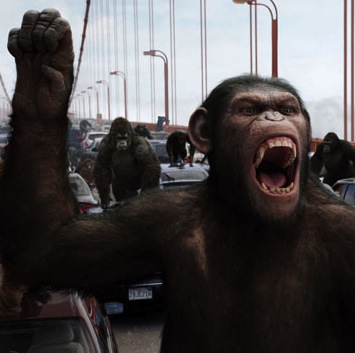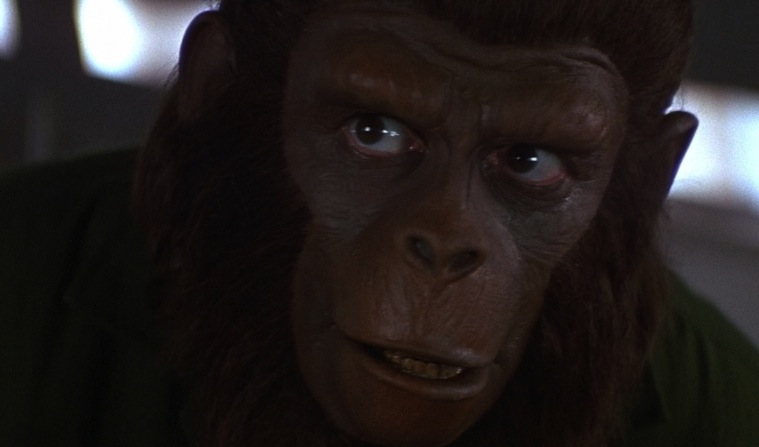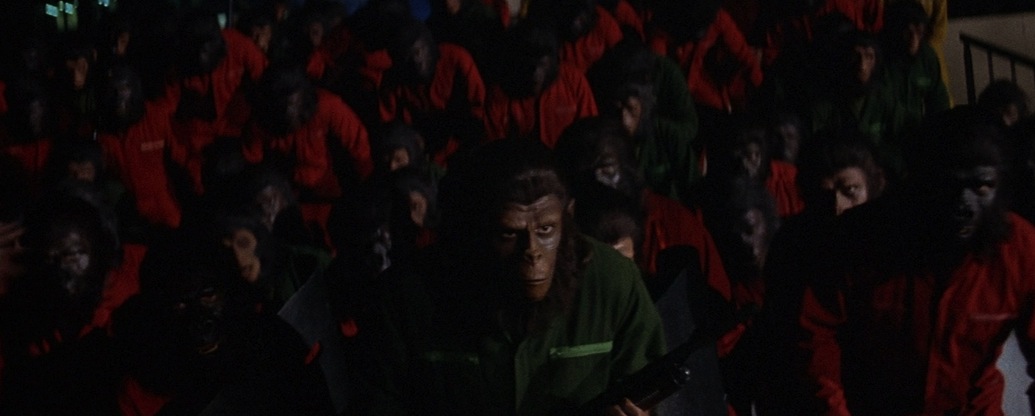 Today marks the release of Rise of the Planet of the Apes. The film features, in addition to a rather long title with multiple modifiers, James Franco as a scientist and Andy “Gollum” Serkis—through a great deal of CG magic—as a genetically enhanced ape that leads a simian revolt that may bring about a planet where apes evolve from men. Those maniacs!
Today marks the release of Rise of the Planet of the Apes. The film features, in addition to a rather long title with multiple modifiers, James Franco as a scientist and Andy “Gollum” Serkis—through a great deal of CG magic—as a genetically enhanced ape that leads a simian revolt that may bring about a planet where apes evolve from men. Those maniacs!
Rise of the Planet of the Apes marks the seventh film in the Planet of the Apes franchise, dating back to the original in 1968. While many people are probably aware that this film is an unofficial prequel to the original series, what may not be such a matter of public knowledge is that it is also a quasi-remake…of the fourth film in the original series.
There is a discrepancy between the chronology of the releases of the films in the original series and their order along the timeline of that franchise’s singular story arc. In other words, if you were to line up all the events that lead from where we are now as a society to a planet dominated by apes, the first film is actually the fourth of five benchmarks. If you haven’t seen any of the original films, now is the time to cease reading because this may get spoilery. Thanks!
Earth sends astronauts into space only to have that same capsule crash down a few years later piloted by fully evolved, articulate apes from the future. They tell us of the dystopian society from wince they came, and that gets some people to thinking that maybe these apes, one of which is pregnant, should be destroyed, as they may be the catalysts for the eventual downfall of the human race. While we succeed in killing the adult mates, their child survives.
 Years pass and the ape kid, Caeser, ends up leading a revolt against the oppressive humans; inciting a nuclear war. Eons later, the astronauts launched from Earth at the beginning of this epic tale arrive in the future to discover humans have devolved and are now subjugated to the apes. Later, one of these humans manages to discover a breed of nuclear mutants living underground who worship a massive atomic weapon, which he then uses to destroy the Earth.
Years pass and the ape kid, Caeser, ends up leading a revolt against the oppressive humans; inciting a nuclear war. Eons later, the astronauts launched from Earth at the beginning of this epic tale arrive in the future to discover humans have devolved and are now subjugated to the apes. Later, one of these humans manages to discover a breed of nuclear mutants living underground who worship a massive atomic weapon, which he then uses to destroy the Earth.
Whew, that was a hell of a ride. But understanding this timeline of plot points is essential to grasping the importance of the fourth film in the original series: Conquest of the Planet of the Apes. This is the turning point, the moment when apes have reached the physicality and relative intelligence necessary to take control. All they needed was the right leader; an ape with enough intelligence to comprehend that his brethren were being unforgivably abused. Namely, Caesar. I count myself an enormous fan of the franchise and Conquest is far and away my favorite entry.
Forget the fact that Conquest was directed by 70s exploitation auteur, frequent Charles Bronson collaborator J. Lee Thompson and has some amazing action sequences. Forget the fact that it has Ricardo Montalban and Roddy McDowall playing the son of his own iconic Dr. Cornelius from the first film. The thing that makes Conquest so fascinating is how racially charged it is.

The film takes full advantage of the tumultuous time in which it was made and serves as a parallel for the struggle of African-Americans to obtain equality. In fact, many of the climatic battle scenes were modeled after the Watts Riots of the 1960s. So while on the surface, this is a campy sci-fi film that furthers the lineage of a campy sci-fi franchise, something far more interesting is at play here.
I would highly recommend picking up the Blu-ray of Conquest of the Planet of the Apes and taking a gander at the unrated director’s cut. J. Lee Thompson takes the gloves completely off and creates a movie as violent and unsettling as was the climate of racial relations in America during that era. Seriously, this cut is mean. But, like it or not, it will give you unique insight into Rise of the Planet of the Apes which also centers on Caesar’s quest to topple the human race and prove which species truly rules the planet.


